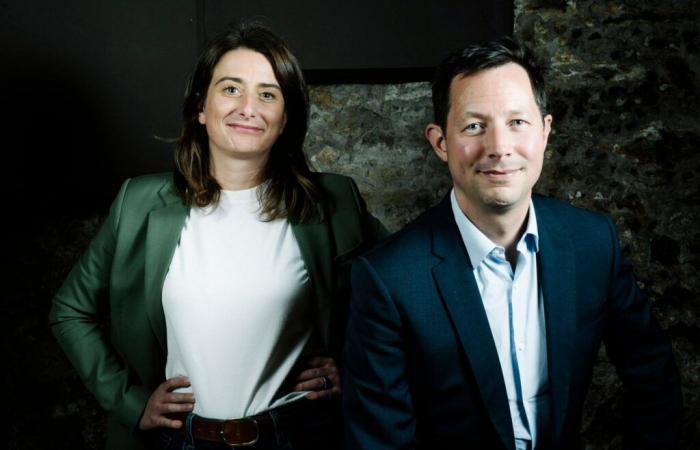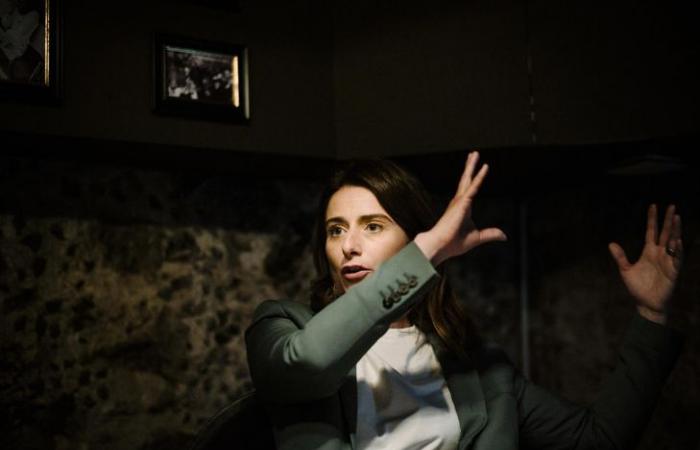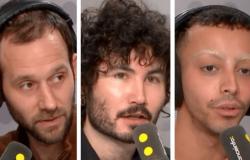The Cross : When was the last time you interacted with someone with radically opposing positions?
Marine Tondelier : An hour ago, because it's part of my daily life: I've always tried to chat with everyone. This afternoon, I organized a live at the Greens' headquarters on Mercosur with Didier Giraud, the emblematic breeder of the show “Les Grandes Moules” on RMC. We have many disagreements, but rather than leaving it at that, I found it interesting to work on what can bring us together. We have also listed “convergences of struggles” between farmers and environmentalists: the refusal of the artificialization of agricultural land, fairer incomes for farmers, more local products in collective catering… In short, in the end, we agreed on many things, and I hope that those who attended the exchange gained food for thought.
François-Xavier Bellamy : Me, it was also this morning and also on Mercosur, but I experienced the opposite result! I was called by a colleague from my own parliamentary group, from another European country, who defends the treaty and had seen that I had spent part of the night with the farmers to support them. And I experienced a real disagreement with a person who was on the same political side as me. This is how we advance the causes we defend, even if the most difficult disagreements are often those which divide the same political family.
Have you ever experienced the complete impossibility of debating?
F.-X. B. : Rarely. The principle of democratic life is to accept that politics must deal with the chiaroscuro of reality. Everyone has a responsibility to serve the common good, but the path to finding it is almost never obvious. We can forcefully defend the vision we want to share, without refusing to take the contradiction seriously and respond loyally. I am not a relativist, but I believe that seeking the truth implies this requirement for intellectual honesty, which gives meaning to public debate.
M. T. : Yes, I have experienced very confusing situations of incommunicability. When I became, at a very young age, an opposition politician in a far-right town hall, I was struck by the violence of the first municipal debates. The mayor shouted, I mechanically raised my voice to be able to finish my speech, he replied by saying that I was hysterical… It was endless! And then one day, instinctively, I made a joke which destabilized him and made the whole audience laugh, even though they were committed to his cause. I gradually developed other weapons: derision, calm, a smile… When you have a mud fight with a pig, you can progress, even manage to beat it on your own playing field, but the difference, it’s because he takes pleasure in it. You must never let yourself be carried away by the brutality of your opponent!
F.-X. B. : I am not a representative of the National Rally, but I am not sure that comparing one's opponent to a pig is an example of respect and the best way to convince…
M. T. : You have not experienced ten years of local opposition to the National Rally…
F.-X. B. : No, but I have experienced very harsh opposition, for example with certain activists or elected officials from La France insoumise. I will not adopt methods that I disapprove of, regardless of the red lines that adversaries may cross. When I received death threats, I simply had to file a complaint.
In public debate, are there subjects on which we can no longer debate?
M. T. : I hope not! Achieving incommunicability would be a terrible trap, because debate is the very essence of democracy. This is why, despite the democratic obstruction of Emmanuel Macron who did not appoint a prime minister from the New Popular Front following the legislative elections, the Greens went to meet Michel Barnier when he was appointed. We clearly told him what we think, while trying to move the topics forward.
F.-X. B. : The tragedy of politics is that disagreement more and more often translates into moral condemnation – on all sides, including sometimes mine. Anyone who doesn't think like me isn't necessarily an idiot or a bastard. We should be able to say it to ourselves, and that would free us from a real weight. But political life today is trapped by the channels of debate. In our Parliaments, what mattered was to debate with the elected representatives in the hemicycle; today, it's to obtain the sequence that will create a buzz on social networks. You are no longer there to convince your colleagues, but to show your voters that you know how to confront them.
On environmental issues, Marine Tondelier, do you sometimes feel ostracized by the right?
M. T. : Ostracized, no, but caricatured, locked in their prejudices, yes. “Ecolobashing” is still very real in politics. We are often caricatured as proponents of a punitive ecology, intended for large cities and targeting the precarious. When in reality, the richer we are, the more we pollute and the poorer we are, the more we are exposed to environmental crises… and therefore protected by environmental policies! I sometimes have the impression that the Pope understood ecology better than many of our politicians…
And on ethical questions, François-Xavier Bellamy, do you have the impression of being ostracized on the left?
F.-X. B. : Caricatures also reign over these debates, that’s for sure. But the most distressing thing is that the same obstacles of thought, which yesterday delayed environmental awareness, are today taken up by a large part of the left. It is basically the same idea that progress would consist of a sense of history based on technicization as an end in itself – yesterday it was about nature outside, today about our own bodies. It is amusing to hear you quote Pope Francis, because many of his comments are considered unbearable on the left, on the end of life or procreation. It indeed offers a coherent vision of ecology, which some who claim to believe in it nevertheless dream of making disappear. While it is regrettable that ecology has long been caricatured as a reactionary fad, the balance of life should also be recognized in our bodies.
M. T. : The difference on these issues that touch on identity is that they can be very violent. I experienced it around me. Discovering their homosexuality at the time of La Manif pour tous was very difficult for teenagers who did not know how to talk about it to their family, or wondered if society would accept them as they were. What responses did you want them to find when they saw activists calling their sexuality “unnatural”?
Marine Tondelier in Paris, November 18, 2024. / Frédéric STUCIN / for La Croix
F.-X. B. : I understand that these debates could have been painful. But many warned about PMA (medically assisted procreation, Editor’s note) and GPA (surrogacy) who followed from this reform, and never said or thought that about homosexuality… We can all find opponents who suit us to discredit their positions.
M. T. : These demonstrations aimed to not give the same rights to certain people, even though doing so would not have taken anything away from anyone… What I am telling you is what young homosexuals told us when they joined us at the Greens. Some political arguments hurt people.
F.-X. B. : The fight against homophobia must bring us all together, and I worry that a large part of the left has chosen to turn a blind eye to the violent homophobia conveyed by Islamism, which has already won far too much field in France. On the subject of rights, the debate is necessary: I do not believe for a moment that there is progress in the “right to the child”, when it means in particular the exploitation of women's bodies by the industry of GPA…
Do you fear today an American-style drift, with a polarization of society?
F.-X. B. : First, let us remember that cleavage is not a problem in a democracy. I never believed in the Macronist promise of “at the same time”. Democratic freedom presupposes pluralism. We should even rediscover the jubilation of contradictory debate!
But by polarization, we mean refusal of debate…
F.-X. B. : Therein lies the danger. I see it on the networks: highlighting a positive person or action has a much smaller audience than negative content. This premium on the negative leads to the increase in violence that we are experiencing: the opponent becomes an enemy.
M. T. : On But not all social networks are equal. X's own algorithm is designed to intensify this outpouring of frustration and hatred. He holds up a distorting mirror, hateful of society. Either it must be regulated or it must be eliminated. It’s like CNews, which environmentalists have decided to boycott…
F.-X. B. : But we have to go back! I respond well to Liberation or to Humanity…
M. T. : You can't compare. CNews is a propaganda agency serving a civilizational project, sanctioned on multiple occasions by Arcom. Concerning the United States, I am of course appalled by the election, at the head of one of the world's largest democracies, of a defender of the carrying of weapons, climate skeptic, author of sexual assault, who praised injections bleach as a cure for Covid… I see conspiracy and anti-scientific discourse rising in France too, including sometimes in the hemicycle of the National Assembly. It's scary!
What commitment would you be willing to make to fight against the polarization of society?
F.-X. B. : For me, the requirement for consistency: giving the same speech, whether the microphones are open or closed. And for the country, fight for our school. There is no democracy without free citizens, and education is the absolute condition for this. Our school is on the ground, despite the dedication of the teachers; if we do not address it, our democracy may die.
M. T. : For my part, I am incapable of expressing myself differently on set than in a private exchange. I propose two concrete avenues: the independence of the media, at a time when a group of ten billionaires represents 90% of the sales of national daily newspapers, 55% of the television audience and 40% of the radio audience, which poses a real democratic problem; and citizen conventions, which are peaceful deliberation frameworks, where we learn to manage dissensus. Furthermore, I think politicians could usefully take the time to keep quiet and listen to citizens.
—
► The “We need to talk” questionnaire
We submitted to our two debaters the questionnaire created for the participants in the “We need to talk” operation.
Can we love each other and have opposing political ideas?
F.-X. B. : Oui.
M. T. : Oui.
Should we reinstate the wealth tax?
F.-X. B. : Non.
M. T. : Oui.
Do you think the MeToo movement has a positive impact on society?
F.-X. B. : Ambivalent.
M. T. : Oui.
Do you think we should arm municipal police officers?
F.-X. B. : Oui.
M. T. : Non.
Should we limit the authorized speed of cars to fight climate change?
F.-X. B. : Non.
M. T. : Oui.
Should we toughen access to social benefits for foreigners?
F.-X. B. : Oui.
M. T. : Non.
Should we ban smartphones from middle school students?
F.-X. B. : Oui.
M. T. : Oui.
Should we introduce a four-day work week?
F.-X. B. : Non.
M. T. : Oui.
Should we fight more against discrimination?
F.-X. B. : Oui.
M. T. : Oui.







